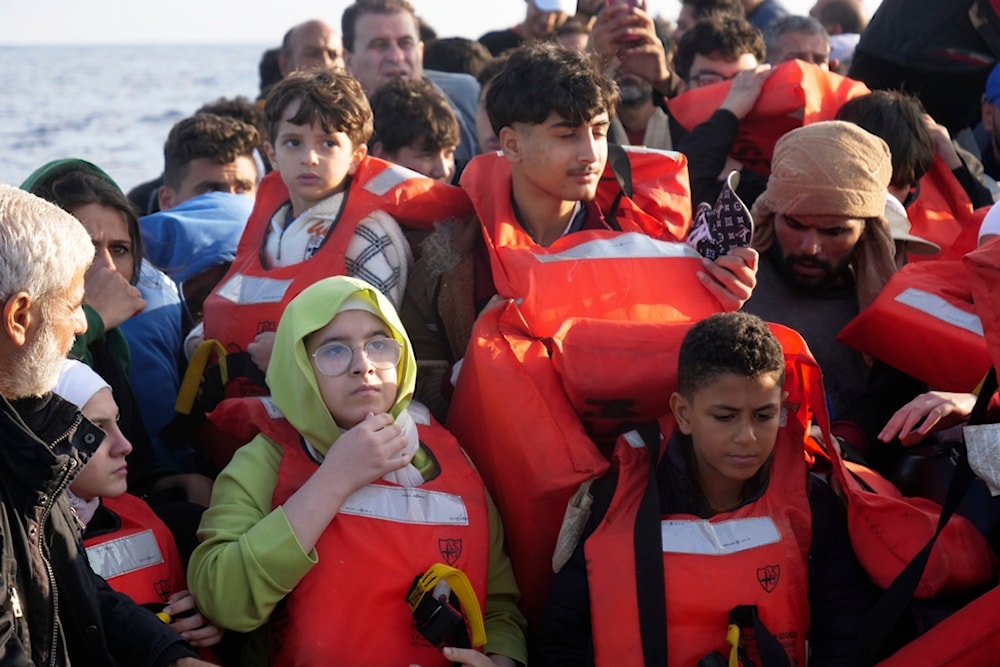Spain, Greece, Hungary scolded for maltreating minor asylum seekers
In a saga of children's rights violations, courts have found the European countries liable for the maltreatment of minors seeking asylum within their borders.
-

Migrants wear life vests as they are rescued by a MSF (Medecins Sans Frontiers) rescue team boat, after leaving Libya trying to reach European soil, in the Mediterranean Sea, Friday, Oct. 6, 2023. (AP)
Courts have been reprimanding each of Spain, Greece, and Hungary for disregarding children's rights and their protection, The Guardian reported.
In a saga of children's rights violations, courts found the European countries liable for the maltreatment of minors seeking asylum within their borders.
Spain
The first incident was berated by the Spanish Supreme Court as Spanish authorities mass deported Moroccan refugees who had crossed the border into Spain, amid the Western Sahara conflict between Madrid and Rabat. Spain opted to deport at least 700 unaccompanied minors without considering and investigating their circumstances.
The court ruled this move was illegal, saying it endangered their lives and put them at risk of "severe psychological harm," breached the country's minors protection and domestic immigration laws, and violated the European Convention on Human Rights.
At the time of the incident, Spanish broadcaster RTVE conducted interviews with 10 immigrant children, all between the ages of 13 and 16. It was reported that they escaped state care to avoid being deported and have been living in the trenches, but would rather have that over going somewhere else where they would be "worse off". The children also revealed that authorities did not ask for any background information when they first crossed the border and did not acknowledge their circumstances.
Spain's Interior Minister, Fernando Grande-Marlaska, defended the decision to mass deport immigrants, claiming it complied with the law and considered the children's best interests, in a discussion with reporters on Tuesday.
Hungary
The Spanish shenanigans came just a few days after the European Court of Human Rights (ECHR) ruled against the Hungarian authorities' endangerment of a 16-year-old Iraqi Kurd immigrant who was sent to the Siberian wilderness after he told police that he was seeking asylum in Hungary. The court chastised the decision, saying the child's age takes precedence over his status as an illegal immigrant, and that his condition, being an unaccompanied minor, makes him vulnerable and in need of aid.
The Hungarian Helsinki Committee, a local non-governmental organization that first presented the case, criticized the government's repetitive misconduct toward asylum seekers, legal adults and minors alike.
“Instead of deporting children without due process, it would be much better for everyone if Hungary were to review asylum applications under a fair asylum system. Because the Hungarian government has been causing suffering and harm for years,” it said in a statement.
Greece
On Tuesday, the EHCR also ruled against the Greek government following its failure to protect an Afgan teenage asylum seeker who arrived in Greece in 2018 and was left homeless for the six months that followed. It was revealed that the minor was fending for himself without any cooperation or governmental aid in an unsafe environment that did not provide basic life necessities like hygiene, accommodation, food, and more.
By the end of 2020, following insistence from the United Nations, Greece developed protection systems that took in asylum seekers, indicating that most of them have been residing in Greek shelters.
A recurrent phenomenon across Europe
The report showcases only the recent incidents of incompetent child protective services in Europe when it comes to minor asylum seekers.
In precedents, the EHCR rebuked France for subjecting an 11-year-old asylum seeker to inhumane conditions and degrading treatment after he was forced to live in the ghettos of Calais, exposed to severe danger, in the absence of government security.
Reportedly, the environment he was in was “completely unsuited to his status as a child and in a situation of insecurity rendered unacceptable by his young age.”
In Britain, 132 minors are missing after 400 unaccompanied minors vanished from asylum hotels. The British High Court ordered the UK Home Office to stop sending them to hotels, where official follow-up and care are limited.
Read more: France joins UK in controversial 'asylum ban' draft bill talks
The migrant crisis poses a risk to EU unity
Despite the EU's commitment to free movement, it has not shown the same flexibility when it comes to asylum applicants. Some member states have resorted to physical barriers, such as Hungary's border fence, to deter migrants.
The EU is facing a critical challenge in dealing with the issue of migration, which has the potential to undermine its very existence.
As previously migrant-friendly countries like Germany and Sweden distance themselves from migrants arriving on Europe's southern shores, it threatens to devolve into a situation where each country prioritizes its own interests. This could provoke strong reactions from nations highly affected by migrant inflows.
While the EU managed to weather the sovereign debt crisis a decade ago, the migrant crisis poses an even greater threat to its unity, op-ed Ross Clark wrote for The Telegraph.
The high-minded ideals that underpin the EU have been severely tested and appear to lack the structural integrity required to address the current challenges effectively.

 5 Min Read
5 Min Read








